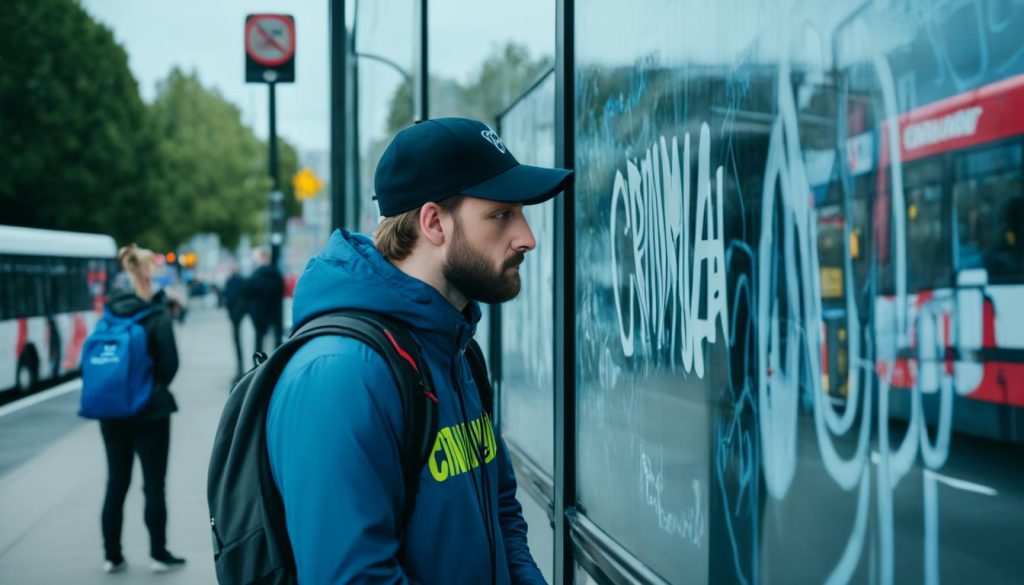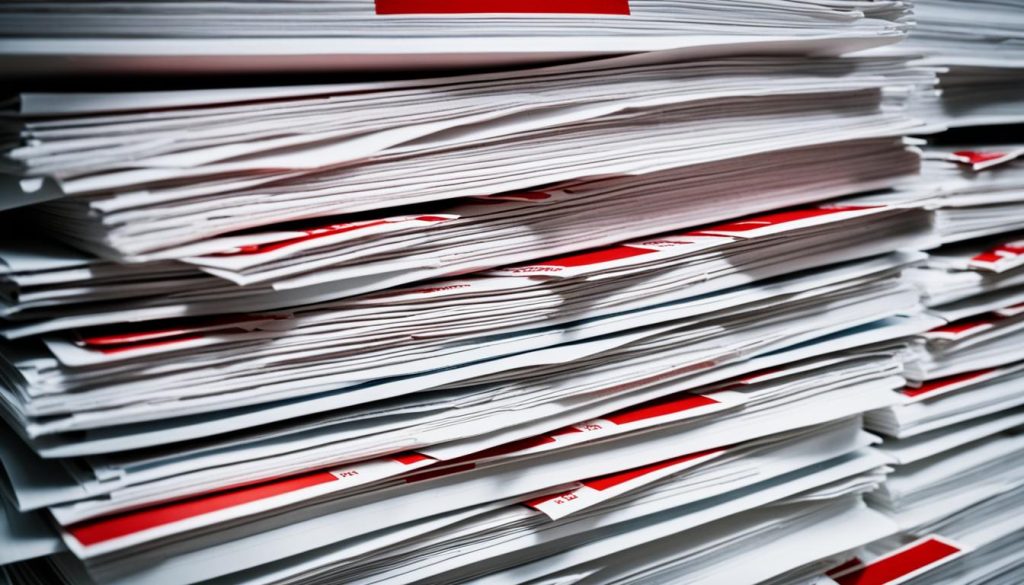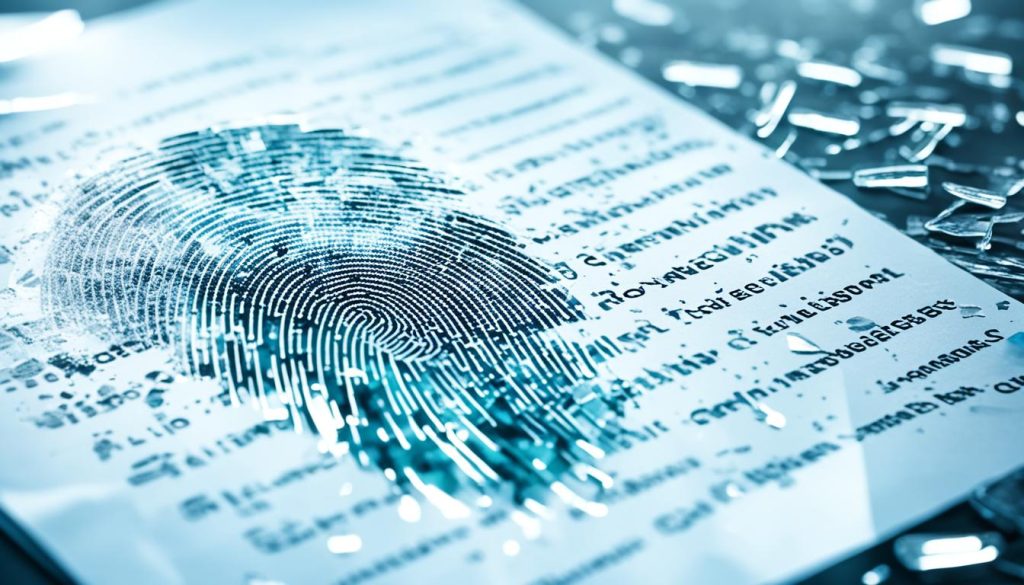In the United States, over 70 million Americans have a criminal record1. This includes both misdemeanors and felonies. These records can affect many areas of your life. You might struggle to find a job, get a driver’s license, or even enjoy basic rights. This article will look at how a criminal record can change your life in the U.S.
Key Takeaways
- The United States holds 20% of the global incarcerated population1.
- Nearly 55% of public school institutions require applicants to disclose their criminal history1.
- Landlords in many states can turn away rental applicants based on their criminal records1.
- Certain professions like real estate, pharmacy, and pest control bar individuals with felonies1.
- Ex-convicts with transportation-related offenses often encounter challenges in maintaining employment due to license suspensions1.
Difficulty Obtaining Employment
Finding a job can be tough for those with a criminal record. Employers often check criminal backgrounds during hiring. This can make it hard to get a job2. Studies show a criminal record can cut a job offer by about 50 percent, especially for African Americans2.
Absence of Employment History
Employers might see gaps in your work history as a warning sign3. If you have a criminal past, it can be hard to show you’re qualified and have changed for the better3.
Flagged Background Checks
A flagged background check shows your criminal history, which can lead to not getting the job3. Some jobs, like in healthcare or finance, must do deep background checks. They might be wary of hiring people with certain criminal records3.
Employer Concerns
Employers worry about your future behavior, especially in jobs that handle sensitive info or money3. Even with expungement, it’s hard to clear serious crimes from your record2.
But, there are ways to boost your job chances. Be honest, highlight your skills, look for employers who don’t mind hiring with a record, and get more education or training3.
| Statistic | Value |
|---|---|
| Percentage of U.S. adults with a criminal record by age 23 | Nearly one-third2 |
| Percentage of arrests in 2009 for serious violent crimes | 4%2 |
| Percentage of arrests in 2009 for property crimes | 18%2 |
| Percentage of arrests in 2009 for drug offenses | 12%2 |
| Percentage of arrests in 2009 for other offenses | 56%2 |
| Percentage of job applicants in the U.S. who reported undergoing a criminal background check in 2018 | Over 70%4 |
| Percentage of employers in the U.S. that conduct criminal background checks for all applicants (2012 survey) | Almost 70%4 |
Transportation Challenges
Having a criminal record can really affect how you get around. If you’ve been convicted of driving under the influence (DUI) or driving while intoxicated (DWI), you might lose your license. This makes it hard to get to work or run errands5.
You might then have to use more expensive ways to get around, like taxis, ridesharing apps, or public transportation. This can make things even tougher financially6. In 2008, the U.S. economy lost about $60 billion because ex-offenders couldn’t work well because of transportation problems6.
Jobs in the transportation industry also have strict rules. For example, transportation companies must check your criminal history and test for drugs5. The Transportation Security Administration (TSA) wants even stricter checks for some jobs in the bus and rail sectors5.
These new rules worry companies about costs and how they might scare off job seekers5. But, services that help with background checks can make things easier and keep companies in line with new laws5.

In the end, transportation challenges for people with a criminal record can affect a lot of people and the economy. It’s important to understand these issues and find ways to help. This can help people get jobs and reintegrate into society675.
Limited Ability to Gain Certifications and Licenses
Having a criminal record can make it hard to get professional certifications and licenses. This can stop you from getting into certain jobs8. Jobs like real estate, pharmacy, insurance sales, and healthcare often don’t allow people with felony convictions9. The rules for getting these jobs vary a lot by state, with some being more forgiving than others.
Professions Barred for Felons
Federal laws keep people with certain convictions from jobs in banking and transport9. They also affect many state-licensed jobs in healthcare and education9. The American Bar Association says over 27,000 state jobs have rules against hiring people with criminal records. This includes over 12,000 jobs for those with any felony and over 6,000 for misdemeanors10.
State Variations and Exemptions
Rules for professional licenses for people with criminal records change a lot by state9. In Arizona, public employers can only block an applicant if the crime relates to the job9. Alaska doesn’t count pardoned convictions, but Connecticut looks at the crime’s relation to the job, how much the person has changed, and time since the crime9. Some states are stricter, making it hard for people with criminal records to get back into the workforce10.
There are efforts to make state licensing laws fairer and clearer10. Lawmakers want to get rid of vague rules, look at each case, and make standards the same for everyone10.
Limitations on Your Rights
Having a criminal record can limit your civil rights a lot. These limits can affect your right to vote, serve on a jury, or hold public office. Some states are trying to change this, but many people with criminal histories face big legal hurdles. These hurdles can deeply affect their civic and personal lives.
One big limitation is the right to vote. In many states, people with felony convictions can’t vote, either temporarily or forever.11 This takes away a key democratic right and stops them from taking part in politics.
- Being on a jury is another right that might be taken away. Depending on the state and the crime, people with criminal records might not be allowed on juries. This limits their civic duty and role in the justice system.11
- Trying to hold public office is also hard for those with criminal records. In some places, people with felony convictions can’t run for or hold elected jobs. This stops them from being active in their communities.11
These limits on rights can affect not just the person but also their families and communities. It’s important to know the laws in your state, as they differ a lot.11 By learning about these laws and fighting for change, people with criminal records can help make society more fair and open.

The effect of a criminal record on rights is complex and often ignored. As we deal with the issues of mass incarceration, we need to look at these limits and work towards a fairer system. This system should let everyone fully take part in civic life.1213
criminal record, background checks, employment impact, legal consequences
A criminal record can deeply affect an individual’s life, long after the legal trouble ends. This record makes it hard to get a job, find a place to live, go to school, and keep professional licenses and certifications.1415
Many employers check backgrounds before hiring, and a criminal record can lower your chances a lot. Employers might not want to hire people with criminal records, making it tough to even get an interview.14 Some jobs are very careful and won’t hire people with criminal pasts14.
Having a criminal record can also hit your wallet hard. People with records might make less money, stuck in low-paying jobs.14 Moving up in your career can be hard too14.
It also affects where you can live, as landlords often check backgrounds and might not rent to those with criminal records.15 Colleges and universities might not let you in because of a criminal record, which can stop you from getting an education.15
Expungement and rehab programs can help, but they’re hard to get through, and the stigma is tough to shake1415. But, there’s a growing push for criminal record reform, giving people a second chance if they’ve turned their lives around.15

In the end, a criminal record has big effects that go way beyond the first legal trouble. It affects jobs, homes, education, and professional licenses. Knowing these effects and looking into expungement, rehab, and legal help is key for people wanting to start fresh and get back into society.141516
Personal Life Impacts
Your criminal record can affect many areas of your life, like child custody and immigration status17.
Child Custody Oversight
A criminal record can hurt your chances in child custody cases. It might limit your rights or make it hard to give your kids a stable home17. Courts look closely at parents’ criminal pasts. A record could lead to more supervision or even losing custody rights.
Immigration Status Effects
Trying to immigrate or become a citizen? Some crimes can stop you from doing so or even lead to deportation17. A criminal record can block you from getting a green card or changing your immigration status. This can make planning your future and taking care of your family hard.
Dealing with the effects of a criminal record on your personal life is tough. But, there are ways to lessen the damage. A skilled criminal defense lawyer can help you try to drop or reduce charges. This could open doors to a better future17.
Conclusion
Having a criminal record in the United States brings big challenges that last long after the legal trouble ends. Finding a job181920 and enjoying civil rights and personal relationships can be hard. A criminal record makes it tough for people to start over after they’ve served their time20.
Efforts like expungement, rehab programs, and laws for a fair chance help a lot. But, the stigma of a criminal record is still a big hurdle for many20. We need to tackle the big issues of mass incarceration and how we handle criminal records. This way, people can have a fair shot at reaching their goals, even after mistakes in the past.
The effects of a criminal record can last a long time and touch many areas of life. We must push for rehab, support fair hiring, and fix the reasons behind mass incarceration. These steps are key to building a society that gives everyone a second chance and chances to succeed20.
FAQ
What is the impact of a criminal record on my life in the United States?
A criminal record can affect many areas of your life. It can make it hard to get a job, find a place to live, go to school, or get certain licenses. It can also hurt your financial stability and personal relationships.
How can a criminal record affect my ability to find employment?
Many employers check criminal backgrounds before hiring. If you have a record, it can make it tough to get a job. Gaps in your work history can raise concerns. Employers worry about your future behavior, especially in jobs that deal with money, trust, or safety.
Can a criminal record impact my transportation options?
Yes, it can. Crimes like DUI or DWI can take away your driver’s license. This makes getting to work or running errands hard. You might have to use expensive taxis, ride-sharing apps, or public transport, which can be tough on your wallet.
Can a criminal record limit my ability to obtain professional certifications and licenses?
Yes, it can. Jobs that need special licenses or certifications, like real estate or pharmacy, might be off-limits with a felony conviction. Some states might consider how long it’s been since the crime, but it’s not always easy to get these rights back.
How can a criminal record impact my civil rights?
A felony can take away your civil rights. This includes voting, owning a gun, being a juror, or holding public office. While some states are trying to give back these rights, it’s hard for those with a criminal record to regain them.
Can a criminal record affect my personal life, such as child custody or immigration status?
Yes, it can. In child custody cases, a criminal record might be used against you. It could limit your rights or make it hard to give your child a stable home. For immigration or citizenship, some crimes can stop you from moving forward or even lead to deportation, making life harder for you and your family.
Source Links
- How a Criminal Background Can Affect Your Life
- In Search of a Job: Criminal Records as Barriers to Employment
- The Impact of Criminal Convictions on Employment Opportunities
- Barred from Work: The Discriminatory Impacts of Criminal Background Checks in Employment – The Thurgood Marshall Institute at LDF
- Will the TSA Soon Require a Federal Criminal Background Check for Transit Workers?
- The Disparate Impact of Criminal Background Checks as Hiring Criteria – FIU Law
- Criminal Background Checks: Impact on Employment and Recidivism
- Conviction, Imprisonment, and Lost Earnings: How Involvement with the Criminal Justice System Deepens Inequality
- 50-State Comparison: Limits on Use of Criminal Record in Employment, Licensing & Housing
- Unlicensed & Untapped: Removing Barriers to State Occupational Licenses for People with Records – National Employment Law Project
- Employer Background Checks and Your Rights
- Arrest and Conviction Records: Resources for Job Seekers, Workers and Employers
- Employing Individuals with Criminal Records
- The Impact of a Criminal Conviction on Your Employment Options – Stowell Crayk
- Impact of a Criminal Record: How to Mitigate the Consequences
- Consequences Of A Criminal Record | Durak Law Firm
- How a Criminal Record Can Impact Your Professional Life…and What You Can Do About It | Tijerina Law Firm, PC
- The Effect of Criminal Records on Access to Employment
- 5 Ways a Criminal Record Can Have a Long Lasting Impact in Your Life
- Ways A Criminal Conviction Can Impact Your Life

